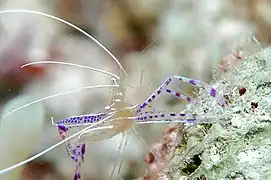| Ancylomenes pedersoni | |
|---|---|
 | |
| Scientific classification | |
| Domain: | Eukaryota |
| Kingdom: | Animalia |
| Phylum: | Arthropoda |
| Class: | Malacostraca |
| Order: | Decapoda |
| Suborder: | Pleocyemata |
| Infraorder: | Caridea |
| Family: | Palaemonidae |
| Genus: | Ancylomenes |
| Species: | A. pedersoni |
| Binomial name | |
| Ancylomenes pedersoni (Chace, 1958) | |
| Synonyms [1] | |
| |
Ancylomenes pedersoni, sometimes known as Pederson's shrimp and Pederson's cleaner shrimp, is a species of cleaner shrimp.[2][3] It is part of the genus Ancylomenes and was described in 1958 by Fenner A. Chace Jr. as Periclimenes pedersoni.[1][4] Ancylomenes pedersoni is found in the Caribbean Sea, often associated with a sea anemone, at depths of 1 to 15 metres (3 to 49 ft). They are often found on the reefs off Bermuda.
Description
Pederson's shrimp is a small transparent shrimp with bluish and violet markings on the body and long white antennae and within its range is unlikely to be confused with other species.[5][6]
Ecology
Pederson's shrimp lives in association with a sea anemone, either Bartholomea annulata or Condylactis gigantea, living among the tentacles with impunity. Before it can do this it needs to acclimatise itself to the anemone by progressively pressing its body and appendages against the tentacles for increasing periods of time. After this it is able to move between the tentacles without getting stung but if it is separated from its host for a few days, it will need to repeat the immunizing procedure. Up to 26 shrimps have been found associated with one sea anemone but usually there are just one or two. The shrimp offers cleaning services to passing fish and attracts their attention by lashing its antennae about. Fish visiting the cleaning station will remain stationary while their external parasites are removed and eaten by the shrimp, which even cleans inside the gill covers and the mouth. If a neon goby sets up a cleaning station nearby, the shrimp will clean the client fish at the same time as the goby does.[5] Researchers have shown that fish recognise the sea anemone Bartholomea annulata as being a place at which the shrimps' services are likely to be available. The larger the sea anemone, the more likely fish are to visit it.[7]
References
- 1 2 Charles Fransen & Sammy De Grave (2011). "Ancylomenes pedersoni (Chace, 1958)". WoRMS. World Register of Marine Species. Retrieved June 1, 2012.
- ↑ Becker, Justine; Grutter, Alexander (2004). "Cleaner shrimp do clean". Coral Reefs. 23: 515–520. doi:10.1007/s00338-004-0429-3. S2CID 8393249.
- ↑ Becker, Justine; Curtis, Lynda; Grutter, Alexander (2005). "Cleaner shrimp use a rocking dance to advertise cleaning service to clients". Current Biology. 15 (8): 760–764. doi:10.1016/j.cub.2005.02.067. PMID 15854910.
- ↑ Bunkley-Williams, Lucy; Williams, Ernest H. (1998). "Ability of Pederson cleaner shrimp to remove juveniles of the parasitic cymothoid isopod, Anilocra haemuli, from the host" (PDF). Crustaceana. 71 (8): 862–869. doi:10.1163/156854098X00888.
- 1 2 Colin, Patrick L. (1978). Marine Invertebrates and Plants of the Living Reef. T.F.H. Publications. pp. 334–335. ISBN 0-86622-875-6.
- ↑ "Pederson cleaning shrimp (Periclimenes pedersoni)". Marine Species Identification Portal. Retrieved 2012-07-18.
- ↑ Huebner, L. K.; Chadwick, N. E. (2012). "Reef fishes use sea anemones as visual cues for cleaning interactions with shrimp". Journal of Experimental Marine Biology and Ecology. 416–417: 237–242. doi:10.1016/j.jembe.2012.01.004.
Further reading
- Calado, R.; L. Narciso; S. Morais; A. Rhyne & J. Lin (2003). "A rearing system for the culture of ornamental decapod crustacean larvae". Aquaculture. 218 (1–4): 329–339. doi:10.1016/s0044-8486(02)00583-5.
- Chace, F. (1972). "The shrimps of the Smithsonian-Bredin Caribbean Expeditions with a summary of the West Indian shallow water species (Crustacea: Decapoda: Natantia)". Smithsonian Contributions to Zoology. 98 (98): 29–39. doi:10.5479/si.00810282.98.
- Crawford, James (1992). "Acclimation of the shrimp Periclimenes anthophilus to the giant sea anemone Condylactis gigantea". Bulletin of Marine Science. 50: 331–341.
- Daphne Fautin; Chau-Chih Guo; Jiang-Shiou Hwang (1995). "Costs and benefits of the symbiosis between the anemone shrimp Periclimenes brevicarpalis and its host Entacmaea quadricolor". Marine Ecology Progress Series. 129: 77–84. Bibcode:1995MEPS..129...77F. doi:10.3354/meps129077. hdl:1808/5906.
- Levine Daniel; Blanchard Orland (1980). "Acclimation of two shrimps of the genus Periclimenes to sea anemones". Bulletin of Marine Science. 30: 460–466.
- Lin J. & Zhang D. (2004). "Reproduction in a simultaneous hermaphroditic shrimp, Lysmata wurdemanni: any two will do?". Marine Biology. 139 (6): 1155–1158. doi:10.1007/s002270100679. S2CID 85014328.
- Middleditch B.; Missler S.; Hines H.; McVey J; Brown A; Ward D; Lawrence A. (1980). "Metabolic profiles of penaied shrimp: dietary lipids and ovarian maturation". Journal of Chromatography. 195 (3): 359–368. doi:10.1016/s0021-9673(00)81470-3. PMID 7410512.
- Nizinski Martha (1989). "Ecological distribution, demography and behavioral observations on Periclimenes anthophilus, and atypical symbiotic cleaner shrimp". Bulletin of Marine Science. 45: 174–188.
- Poulin, Robert; Grutter, Alexander (1996). "Cleaning symbioses: proximate and adaptive explanations". BioScience. 46 (7): 512–517. doi:10.2307/1312929. JSTOR 1312929.
- Rhode, K. (2002). "Ecology and biogeography of marine parasites". Advance Marine Biology. Advances in Marine Biology. 43: 2–86. doi:10.1016/s0065-2881(02)43002-7. ISBN 9780120261437. PMID 12154612.
- Sargent, Craig; Wagenbach, Gary (1975). "Cleaning Behavior of the shrimp, Periclimenes anthophilus Holthuis and Eibl-Eibesfeldt (Crustacea: Decapoda: Natantia)". Bulletin of Marine Science. 25: 466–472.
- Spotte, Stephen (1995). "Supply of regenerated nitrogen to sea anemones by their symbiotic shrimp". Journal of Experimental Marine Biology and Ecology. 198: 27–36. doi:10.1016/0022-0981(95)00169-7.
- Sterrer Wolfgang (1986). Marine Fauna and Flora of Bermuda. Vol. 1. John Wiley & Sons, NY. pp. 545–548.
External links
- Photos of Ancylomenes pedersoni on Sealife Collection